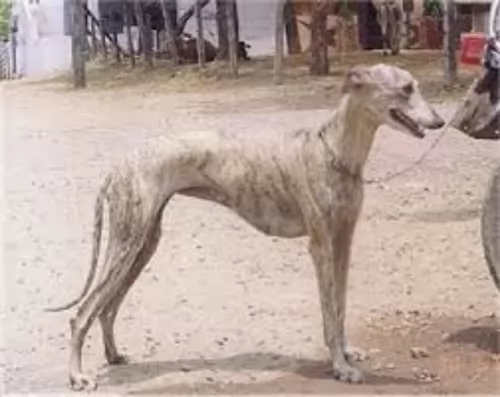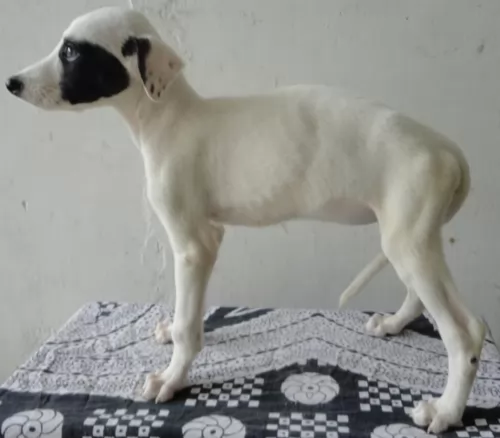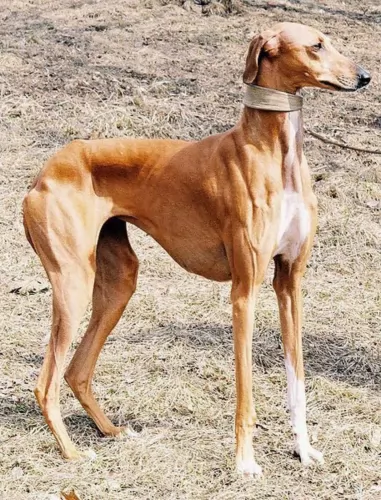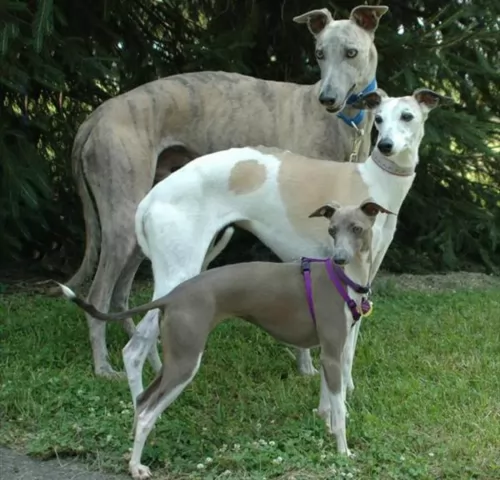 Petzlover
PetzloverBoth Rampur Greyhound and Santal Hound are originated from India. Rampur Greyhound may grow 30 cm / 12 inches higher than Santal Hound. Rampur Greyhound may weigh 18 kg / 40 pounds more than Santal Hound. Both Rampur Greyhound and Santal Hound has same life span. Both Rampur Greyhound and Santal Hound has almost same litter size. Both Rampur Greyhound and Santal Hound requires Low Maintenance.
 Known also as the North-Indian Greyhound or the Rampur Hound, the Rampur Greyhound is native to the Rampur area of Northern India.
Known also as the North-Indian Greyhound or the Rampur Hound, the Rampur Greyhound is native to the Rampur area of Northern India.
This dog is a member of the sighthound family, and in the past has been sought after for its efforts in controlling jackals.
The dog is also able to cover large distances at high speed. Some commemorative postage stamps were issued in 2005 as acknowledgement of this attractive dog breed.
The Santal Hound has always been used for hunting and these Indian pariah dogs haven’t changed much over the years.
It is a small red Indian indigenous dog. It is named after the Santal tribe who used the dog for hunting. They sometimes refer to the dog as Seuta and Kukur.
When you do research on the Santal Hound, you will mostly find it among indigenous peoples. It isn’t only found in India but in Africa, being found among the different nomadic hunting tribes in East Africa.
 In height, the Rampur Greyhound stands at between 55 and 75 cm and they weigh in the region of 27 to 30kg.
In height, the Rampur Greyhound stands at between 55 and 75 cm and they weigh in the region of 27 to 30kg.
They are much the same as other greyhounds, but they’re somewhat wider and just a little bit more muscular. The head too, is broader than the slimmer head of the English Greyhound. Of course these dogs are known for the slim, pointed nose, the high-set ears which are sometimes half-floppy, half-erect. The eyes are large and the tail is long and slim.
The coat is short and smooth and is in colors such as gray, fawn, some white, some black with white and some brindle.
Your Rampur Greyhound is social around his human family, lapping up all their attention. He is the kind of dog that can be seen sprinting at high speed over the fields, but he is also not averse to lying peacefully with you on the sofa.
He is far better suited to a home with large gardens or on a farm as opposed to being confined to a small property in the city.
He can be gentle but when required, he becomes an excellent watchdog. He will need training and socialization as he can be rambunctious indoors, knocking things over. Training makes him obedient and restrained They get on well with children and other pets in the home.
The Santal is considered a small to medium sized dog standing at between 40 and 45cm in height and weighing between 9 and 12 kilograms.
It is also slightly built with fine bones. The coat of the dog is reddish brown or yellow-brown, the eyes are almond shaped and brown and the muzzle is pointed. The ears of the dog are erect and point forward. The tail of this dog is usually curled over the dog’s back. The dog doesn’t really bark as such but howls instead. It has small paws and walks with a high-stepping style like a prancing horse.
These dogs are calm, independent, loving and loyal and also affectionate with their human family. He is cool with strangers.
They are alert, intelligent dogs and you certainly won’t have any trouble teaching him a few simple commands. He cleans himself like a cat. He seems to understand what you say as he always cocks his head to one side when you talk to him. He is a playful dog and will love to be involved with games with the children.
He can also get on well with other dogs in the family. He is capable of adapting to life in the city or the countryside just so long as his exercise needs are met.
 Everyone loves the Rampur Greyhound, and why not? He is fantastic with children because of his gentle, loving nature. He is a playful dog too and will require a daily dose of exercise.
Everyone loves the Rampur Greyhound, and why not? He is fantastic with children because of his gentle, loving nature. He is a playful dog too and will require a daily dose of exercise.
They aren’t noisy dogs, being naturally timid, but he still loves to get out and about with his daily walk to see and experience new sights and smells.
When you bring a Rampur Greyhound into your home, you’re bringing in a whole lot of wonderful companionship, love and loyalty from this remarkable canine.
The Santal dog is an unusual dog with some unique characteristics. He hasn’t got any particularly exceptional characteristics either, but he promises to make you a good pet.
He is capable of providing you with lots of love, and on top of that he is a low maintenance dog too.
When you bring him into your home, you’re going to get yourself a loyal, loving pet and companion.
 Rampur Hounds are generally a healthy dog breed, and their health is enhanced when you take good care of them and provide them with lots of love, good food and exercise.
Rampur Hounds are generally a healthy dog breed, and their health is enhanced when you take good care of them and provide them with lots of love, good food and exercise.
Still, every dog can fall prey to any one of the many dog illnesses there are such as cancer, bloat, diabetes, ear infections, epilepsy, obesity, eye problems and others.
This can be deadly for your dog. Gas collects in the stomach and the stomach can twist. You’ll notice your dog has a hard, swollen stomach and he is lethargic, but restless. Getting him to the vet as quickly as possible should be a top priority.
Your pet can develop all kinds of skin problems where he bites and scratches, causing bacteria. It can be terribly painful for your pet, and even ticks and fleas on the skin can cause cause a lot of irritation for your pet.
Some people add in omega 3 oils to their pet’s diet to help with dry skin. Don’t let your pet suffer with skin allergies and other problems that are itchy and painful. Get him to the vet so you can get to the root of what is causing him so much frustration with his skin.
Dogs stand a better chance of avoiding sickness if they are fed well and they get a fair amount of exercise. But our fur kids can get sick anytime really, and it pays to know about some of the dangerous diseases they can succumb to -
Your dog will have a fever, he will be lethargic and have diarrhea with vomiting. It is a contagious virus affecting dogs that come into contact with the feces of an ill dog. It attacks a dog’s internal organs, and although the vet will do everything possible to help your dog, parvo is often fatal.
Your dog will be coughing, have respiratory problems, lethargy and weight loss. These parasites are found in your dog’s heart and are spread by mosquitoes. Check with your vet about treatments to prevent this horrible illness.
Have your pet vaccinated against rabies, a deadly diseases spread by saliva and a bite from an infected animal. It is fatal and once your dog has this disease, there is no treatment.
 Active and playful, your Rampur Hound will need a lot of space to let off steam and run. He will look forward to his walks every day with you. Maybe you’ll need a tennis racquet to hit the ball far enough for him to sprint after.
Active and playful, your Rampur Hound will need a lot of space to let off steam and run. He will look forward to his walks every day with you. Maybe you’ll need a tennis racquet to hit the ball far enough for him to sprint after.
These dogs, with their short coats, are considered to be low maintenance, even though they do shed.
A good brush twice a week will do them good and they just love being massaged. It’s your time to run your hands over the slim, muscled body to make sure there are no unusual lumps on him.
Follow a regular grooming regime when you brush him. Check inside his ears, have a look at his eyes to make sure they’re still bright. Check inside his mouth for bad teeth which could be causing him terrible pain and make sure to trim his nails.
To be healthy and content, every dog needs good food.For convenience it can be great to feed your Greyhound one of the high quality commercially manufactured dog foods. To vary the food occasionally, add in some delicious home-made food too.
Once or twice a week you can simply add some home-made food to the dry kibble. Boiled chicken, brown rice or pasta and spinach, sweet potatoes and carrots are a healthy choice for your pet. Nothing complicated.
If you cook it in bulk, you can chop it all up and feed smaller portions to your pet. Some raw meat added in from time to time will also keep him healthy.
A simple meal like this will please your dog no end. No exotic spices and strange, weird kinds of food which could upset his stomach – just plain and simple the way dogs love it.
Ensure there is always a bowl of fresh, cool water within his reach.
Provide your Santal Hound with top quality food to ensure his health. While there are some excellent commercially manufactured foods on the market, it is important to choose the high quality ones that have natural, good ingredients in them.
Try to include some home-made food for him which can be simply mixed into the dry kibble twice a week. Boiled chicken, brown rice or pasta and spinach, sweet potatoes and carrots are super tasty and nutritious. Your dog will love such simple, good food as it doesn’t upset his stomach.
If you can, try and include a little bit of raw meat to his diet occasionally as this can go towards ensuring he doesn’t get skin diseases.
Trim your dogs nails, check his eyes and ears for infection and check his teeth too.
Provide your dog with a warm, dry place to sleep.
Don’t allow your Santal Hound to have puppies. There are so many unwanted puppies all over the world. Rather have him or her spayed or neutered to avoid puppies that nobody wants. It is beneficial for his health too.